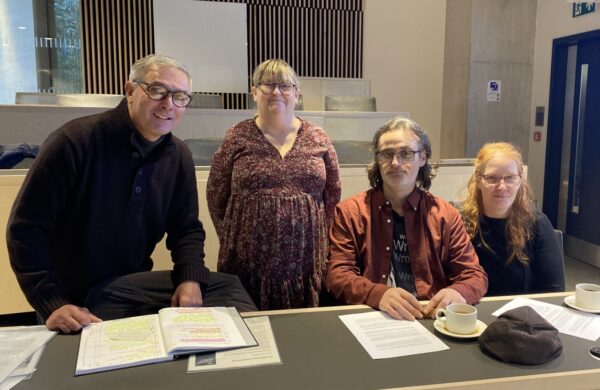Gathering on the Margins – 12 May
This week in Gathering on the Margins, we heard from a number of creative people who told us about how they are using art and creativity to respond to COVID-19.
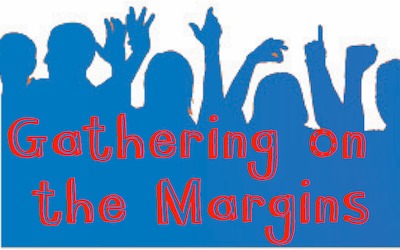
We have these gatherings every Tuesday at 2 pm. Join us on Zoom to connect with people across the country to hear each other’s stories, discuss issues that we are facing and share advice.
Join us on Zoom by clicking the link below, or call 0131 460 1196 and using the meeting ID: 193 697 232
Digital Poet in Residence, Matt Sowerby, spoke about the importance of creativity at this time and how, despite the cancellation of all festivals and gigs, there is actually a renaissance of creativity happening at the moment as people respond to the crisis in different ways. However, he also talked about the importance of not putting pressure on yourself to be productive in difficult circumstances.
Matt’s special interest is in art as a way of making change, and says that is through creativity that when we come out of this pandemic we will stop things just going back to the way they were before. You can find some of Matt’s creative responses to the pandemic here.
Broden is a filmmaker based in Clitheroe who has worked with Church Action on Poverty on a couple of projects, including creating the film Edgelands, based upon the stories of a group of young people growing up in poverty in Lancashire. If you haven’t seen this film it is well worth a watch, you can find it here.
Broden told us about his creative process. His work mainly centres around the stories of working-class youth, and he creates really authentic pieces by using street-cast actors and incorporating real people’s stories into his work. Broden also reflected on our need for art at this time as a source of comfort. Broden seeks to use film at time like this when so many people to capture the smaller stories and highlight the ‘underworlds that are much closer to home than people would like to think’.
Next we heard from Lisa, who works with Food Power in Plymouth and uses creative methods to help people share their stories. Lisa has a background in visual art and art history and is interested in who gets to be the artist, how the art is shared, how that’s understood and art as a collective process.
As part of her work with Food Power in Plymouth she has been part of creative workshops, from which a collection of audio and visual material has been put together, and she shared with us a couple of images from this. Lisa explains how art can help people express issues that are both personal and relevant to a larger issue. To adapt to the current situation Lisa is working with a small team in Plymouth on a creative methods toolkit that can be shared online.
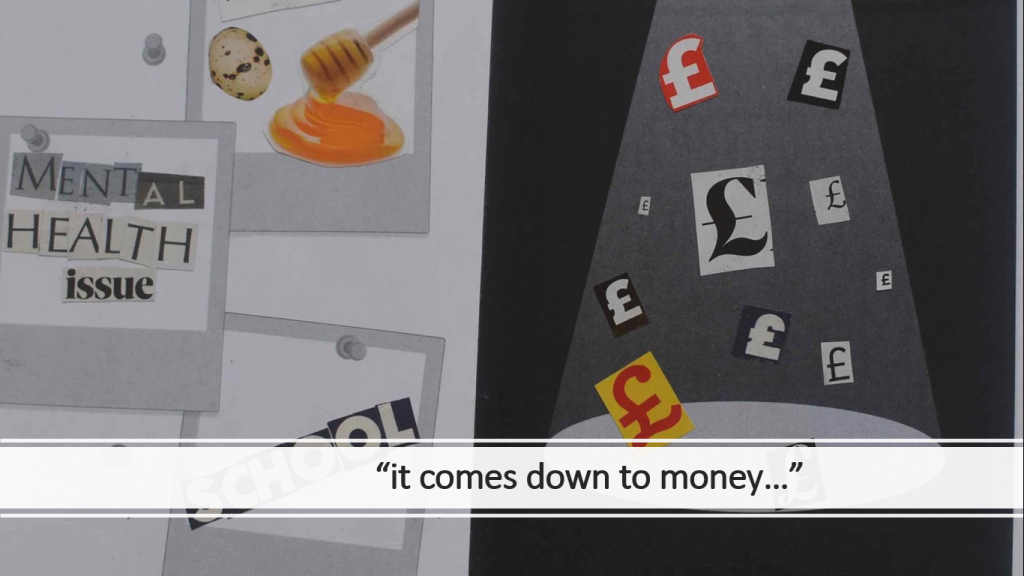
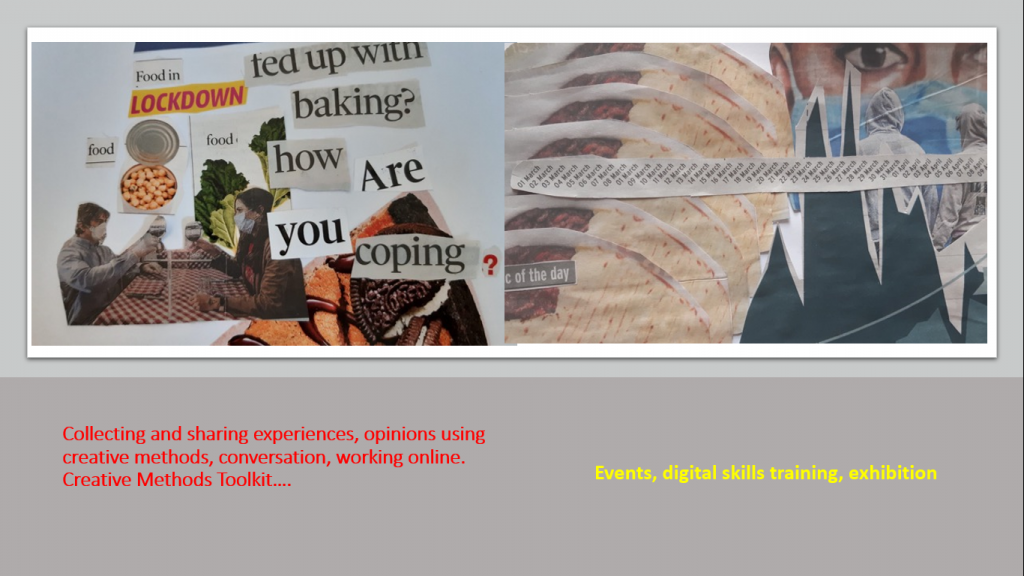
Ellis, an actor/write from Liverpool, told us about various aspects of his work, which includes, writing, performing, blogging, directing, contemporary dance and spoken word. Ellis’ work explores the relationship between politics and art. He told us how he began creating work around the issue of child poverty when his school was badly affected by cuts and he wanted to speak out about this. Ellis is also a blogger; you can read his blog, Skinny, Shattered, Skint here. Ellis and others will also be leading online workshops about creativity in the coming weeks, you can find out more here.
Jayne spoke about the restorative power of creativity and how it helped her through addiction recovery. Now she is helping to keep people afloat by keeping them connected during isolation. She has started a local Whatsapp writing group, giving people the opportunity to express themselves creatively. She says that being able to write and paint is like having a pulse and that it makes her healthier physically mentally and spiritually.
During the gathering we were set the task of creating something, be it a picture of a poem etc., in response to the question ‘Are we all in the same boat?’ Here are a few examples of what was produced from Kathryn, Broden and Isaac:
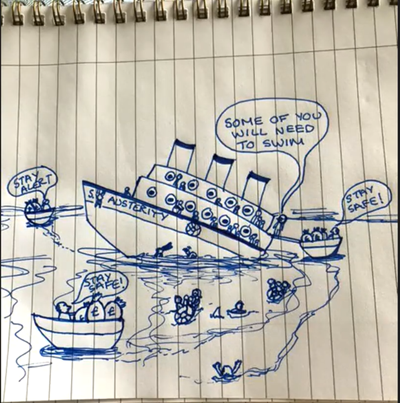
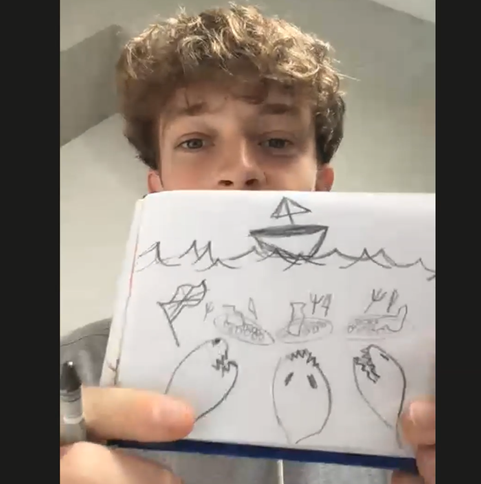
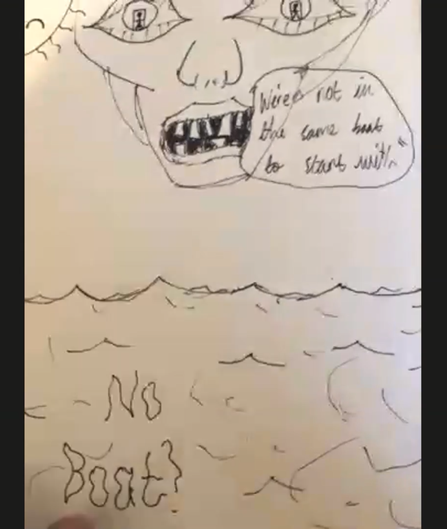
Finally, we heard from the musician Isaac who explained how he has been using music to honestly express the loneliness of lockdown, and how writing songs can help him get into a better headspace. In response to the question, ‘Are we all in the same boat?’ Isaac said that there isn’t even a boat in the first place. You can listen to ‘It Could be Worse’, a song about Covid-19 here.
Next week we will be looking beyond the lockdown and imagining a better future post-coronavirus. We will be hearing from Barry Knight from Rethinking Poverty and others to hear how they think society can change for the better as we come out of this pandemic. Join us on Tuesday to share your thoughts and ideas about how to stop things just going back to a normal that we know wasn’t working.
Over the following few weeks, the gatherings will be focussing on:
- 19 May: ‘Building back better’ – visions of how we can do things differently after the pandemic
- 26 May: Coordinated responses and resilience
- 2 June: Children and young people

